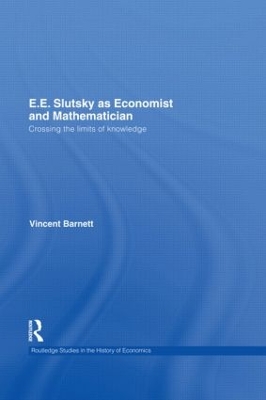Routledge Studies in the History of Economics
1 primary work • 2 total works
Book 128
E.E. Slutsky is perhaps the Russian/Ukrainian economist most quoted by mainstream economists today. This is the first research monograph to examine the life and work of the internationally-renowned economist and mathematician. It does so from both a ‘history of economics’ perspective and a ‘history of science’ perspective, bringing these two strands together in order to demonstrate Slutsky’s enduring legacy as an innovative researcher and an influential intellectual. It also presents some of Slutsky’s lesser-known (and hitherto-unavailable) works in English translation.
D.I. Mendeleev (1834-1907) is undoubtedly Russia’s most famous scientist and one of the world’s most famous chemists from any period. He is known and respected internationally as the inventor of the periodic table of elements and as a pioneer in the understanding of the nature of chemical periodicity, but what is far less recognised is that he was also a major economist and policy-maker who had a profound influence on Russian development strategy in the latter part of the nineteenth century. A key figure behind the development of the 1891 tariff in Russia, Mendeleev promoted protectionist ideas in many of his economic and political writings, and campaigned actively and successfully for the translation of such sentiment into concrete policies.
The author of numerous works in the field of economics, Mendeleev had a significant role in designing government economic policies, and his personal involvement in various aspects of economic and agricultural life in Russia was ongoing and deeply felt. Despite this mass of activity and his body of work, there has so far been no book-length study in English of Mendeleev’s economics both as theory and as policy. Including, for the first time, the the translation from Russian into English of several important segments of Mendeleev’s writings on economics, this volume will break new ground in its exploration of Mendeleev’s economic thought, and of the relationship between this and his work on theoretical chemistry. In doing so, the book will not only illuminate scholarly understanding of this important scientist and the Russia of his time, but also offers insights that are relevant to contemporary debates on free trade.

